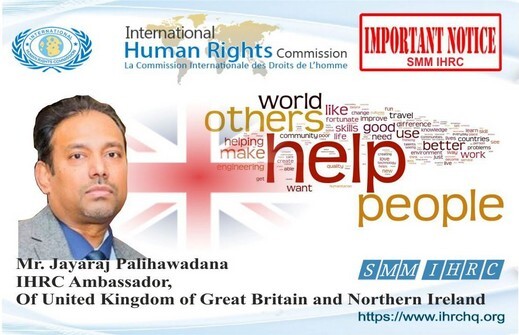COVID-19
What we do > COVID-19 Europe > UK of GB and NI
 This is a worrying time for many people, IHRC expect governments including ours here in the UK to fight against coronavirus (COVID-19 with utmost priority and recognising the need to protect everyone’s human dignity. It is vital that we can be assured safety includes the protection of our dignity and not losing the rules of fairness and respect in the way power is used to respond to this situation.
This is a worrying time for many people, IHRC expect governments including ours here in the UK to fight against coronavirus (COVID-19 with utmost priority and recognising the need to protect everyone’s human dignity. It is vital that we can be assured safety includes the protection of our dignity and not losing the rules of fairness and respect in the way power is used to respond to this situation.Human rights are our roadmap for peace times and times of crisis; our governments must ensure that its response has these rights front and centre in decision-making process.
With this in mind, we better take a look at some of the human rights issues involved in the UK Corona Virus Bill, particularly in relation to health and care for people who are already in vulnerable situations. As this Bill includes a number of new powers for the Government, careful scrutiny of the Bill is needed to check how these powers will be activated and the processes for them ending, making sure there is a system of checks and balances, as with any good democracy.
There is no argument that most human rights can indeed be restricted, and times of public emergency may be one of these situations. We are certainly facing an unprecedented situation which is ever changing; but this is precisely why safeguards are so important. Any restrictions must be carefully thought through, so that restrictions are rights-respecting rather than breaching the very standards that we all need to maintain our safety and dignity.
We welcome measures including mortgage relief and support for businesses – but have been concerned by the significant gaps and questions that remained, including for those that are renting their homes. We are therefore pleased that the Prime Minister has announced he will act to protect renters from eviction. However, there’s no commitment to supporting those working on precarious contracts, often without sick pay or safety net and this need to be urgently addressed. So, while there is much to be welcomed, there is clearly a lot more that needs to be done and it is now vital that the government give equal focus to supporting those most vulnerable.
In UK the Chancellor has set out a package of temporary, timely and targeted measures to employees through a Coronavirus Job Retention Scheme which will be able to access support to continue paying part of their employees’ salary for those that would otherwise have been laid off during this crisis . Employers must take care to not discriminate when deciding which employees to place on ‘furlough leave’. However, it is not expected to be discriminatory to offer it to employees considered as ‘vulnerable’ as per government guidance. This is on the basis that offering ‘furlough leave’ to vulnerable individuals in line with the guidance is likely to be acceptable ‘means of achieving a legitimate aim’.
This crisis begs for a bailout for the most vulnerable, special attention to the most vulnerable individuals must be prioritised in times of financial crises and emergencies. However, we understand that this issue goes beyond human rights. We are talking about what a country wants to be known for, even what it is. Societies that prioritise fairness will do best out of this crisis.
 Jayaraj Palihawadana
Jayaraj PalihawadanaIHRC Ambassador,
Of United Kingdom of Great Britain and Northern Ireland









